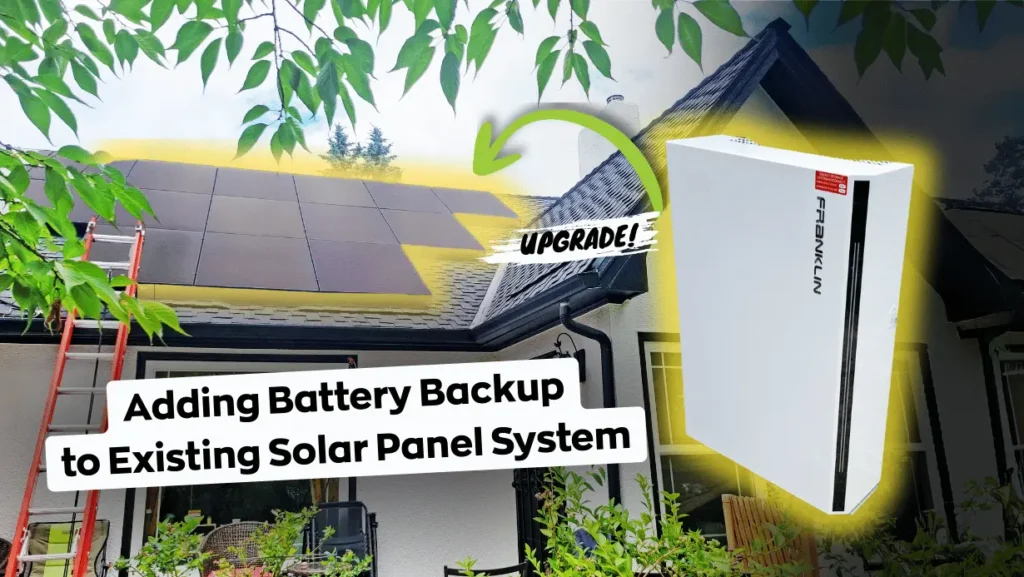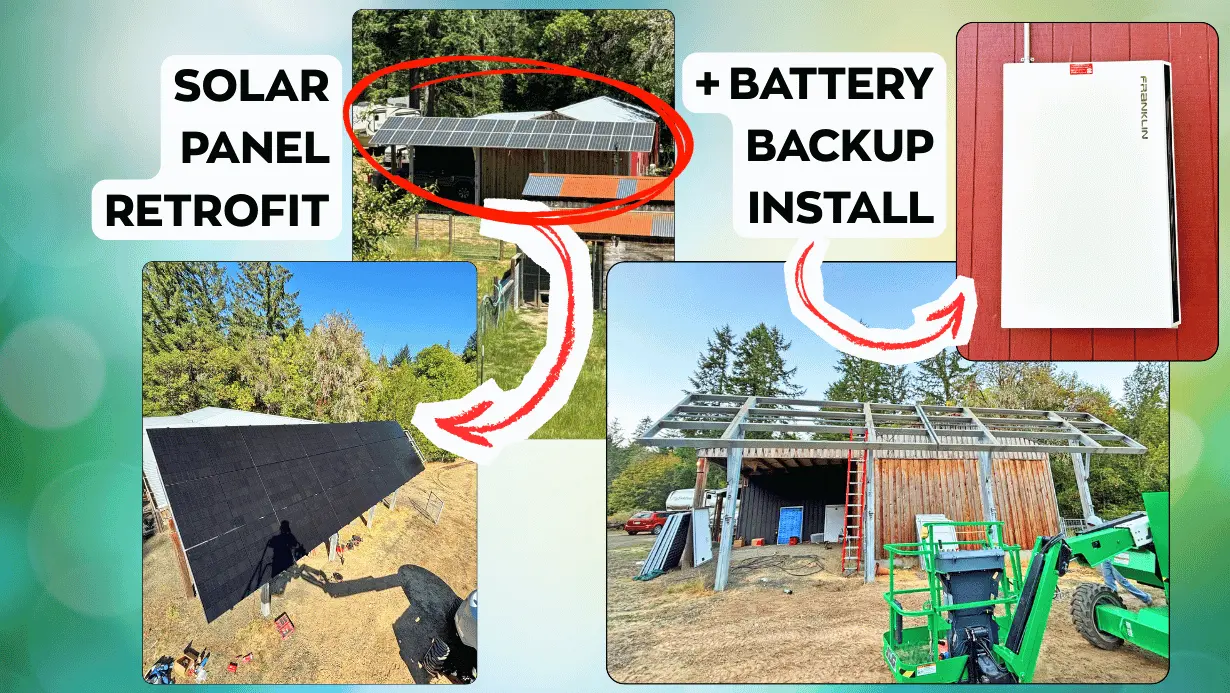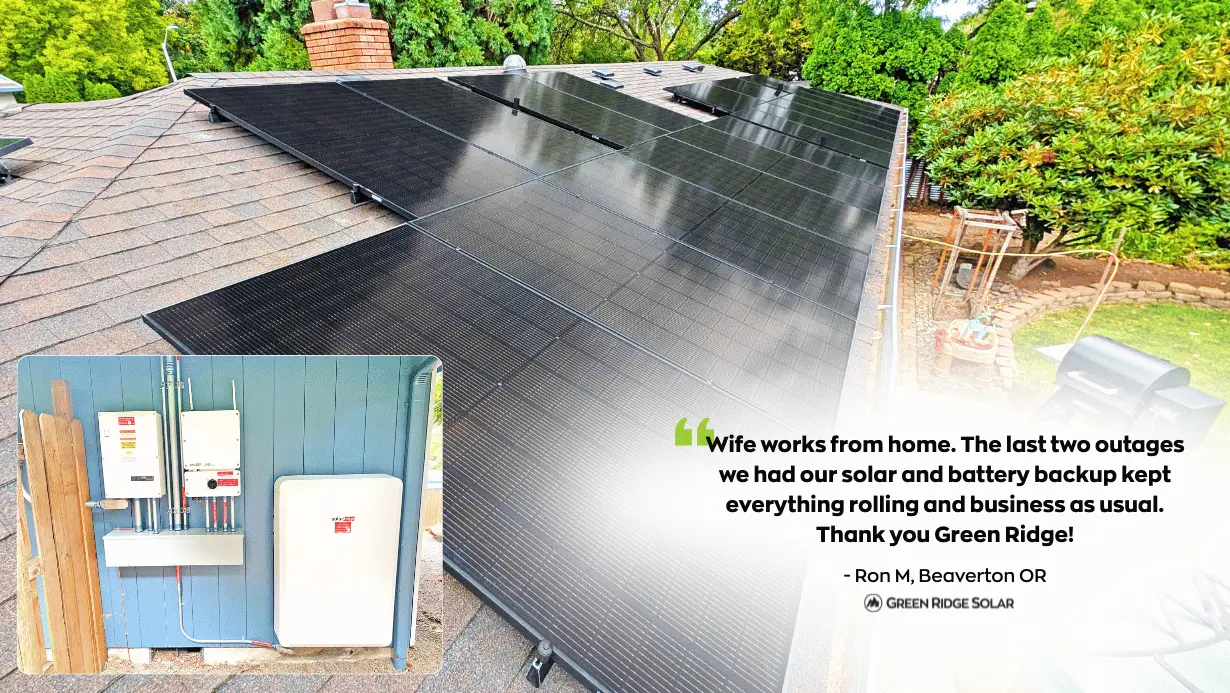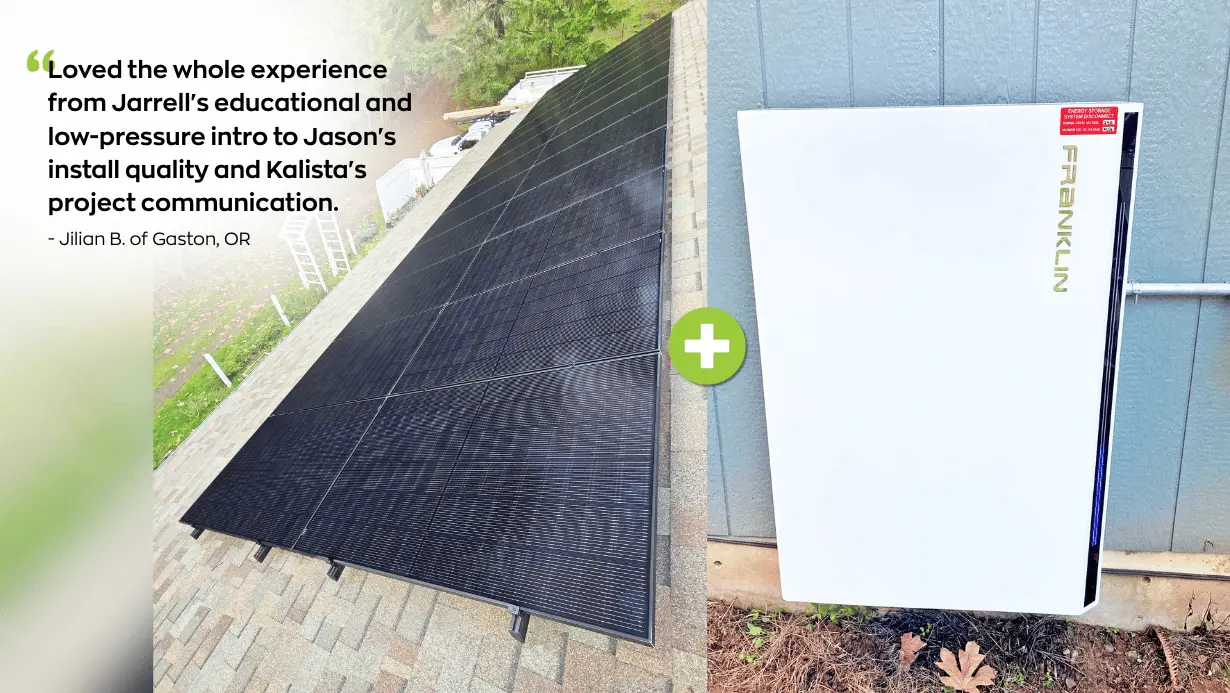If you already have solar panels, one of the smartest next steps you can take is adding a battery backup system. While your panels are producing clean, renewable energy and lowering your utility bills, without a battery, that power can only be used in real-time or sent back to the grid (often for less than it’s worth). At night, during cloudy periods, or when the grid goes down, your home still depends on the utility for power. This means your solar independence is incomplete, and your home remains vulnerable to outages and rate hikes without battery backup.
Adding battery backup transforms your existing solar system into a 24/7 energy resource. It stores excess energy you produce during the day so you can use it at night, during peak rate periods, or in the event of a blackout. This upgrade not only increases your savings and energy independence but also ensures your solar panels work for you even when the grid isn’t. Here’s why pairing battery storage with your current solar panels is the next smartest step you can take.
See how battery backup could benefit you + get a free battery quote. Learn how many batteries you might need.
The Missing Piece in Your Solar Setup: Batteries
Most homeowners are surprised to learn that a solar panel system without a battery still depends heavily on the grid. Your solar panels produce electricity when the sun is shining, and any surplus power you don’t use is exported back to your utility. Often that excess solar energy that is sent to the grid allows you to receive energy credits under net metering programs. Later, when the sun sets and your panels stop producing, your home draws power from the grid, and you start getting charged for electricity again. Those net metering energy credits can be used to offset your grid energy consumption, providing a way to benefit from solar energy even if you aren’t using that energy it in-the-moment. The same is true for seasonal solar changes, where solar panels overproduce in the summer and use net metering energy credits to offset grid power consumption in fall and winter.
This give-and-take arrangement works, but it comes with limitations. If your utility offers full retail credit for exported energy (1kWh credited for every 1kWh of solar energy exported to the grid), you might get close to breaking even. But in many states, utilities have begun lowering these rates or restructuring net metering entirely, reducing the value of every kilowatt-hour you send back. A battery changes this equation. Instead of sending all your excess solar away to the grid, you can store it and use that energy later on your own terms. It turns your solar system from a “daytime generator” into an all-day energy supply.
Learn more about solar net-metering and how excess summer solar production can offset dark and rainy weather in fall and winter.
Protecting Your Home From Power Outages with Batteries
One of the biggest reasons homeowners add batteries to their solar panel system is for protection against power outages. Whether it’s caused by extreme weather, grid instability, or planned utility shutoffs, blackouts are becoming more frequent in many parts of the country. These frequent blackouts mean a greater need for battery backup and a reliable, quickly deployable way for homeowners and businesses to keep power during outages.
Maintaining power during power outages is not just convenient, it can be critical to some homeowners and businesses. If equipment or appliances such as medical devices, heating, cooling, lights, refrigeration, security equipment, etc. lose power in an outage, it could pose significant health and safety hazards.
Power outages can also be inconvenient and/or costly for homes and businesses. For business and those who work from home, power outages can cause costly downtime, lost or damaged product inventory, and potential danger to staff and customers. For homeowners, power outages can leave families stranded in the dark for hours or days without climate control, refrigeration, hot water, cooking appliances, and the ability to charge phones. All of these can be costly, inconvenient, or dangerous. That’s why adding battery backup to your solar panel system is important.
When paired with your solar panel system, a battery can instantly kick in during an outage, keeping essential appliances running for hours or even days. You decide what’s critical – your refrigerator, lights, Wi-Fi router, sump pump, or heating and cooling system—and the battery prioritizes those loads automatically. Without a battery, your solar system shuts off during outages for safety reasons, even if the sun is shining. With a battery, you can ride through the storm without a flicker. That peace of mind is hard to put a price on.
Learn more about the price and perils of power outages and how battery backup can keep your home, family, and business safe.

Keeping More of Your Solar Energy with Batteries
Right now, your solar panels likely send a large portion of their midday output to the utility grid. In the early years of solar adoption, utilities often credited homeowners at the same rate they charged for electricity (1kWh credit for every 1kWh solar energy put on the grid). This billing policy is called net metering. But in many states, those days are over. Under programs like California’s NEM 3.0, exported solar is now credited at a much lower “wholesale” rate, sometimes a fraction of what you pay to buy power back later.
These changes in net metering could mean a longer payback period for solar panels and a reduced return on investment (ROI). If utility companies no longer provide a dollar-for-dollar, 1:1 net meting credit (1kWh credited per 1kWh overproduced), solar owners won’t receive the same level of financial benefit from their solar panel system. For example, a solar panel system originally designed to overproduce power during the spring and summer to offset fewer sunny days in the fall and winter with the assumption the utility company will provide a 1:1 net metering benefit will likely not be able to offset their full year’s energy needs.
With battery backup paired with solar panels, you can store that excess power instead of essentially “selling” it to the utility at a discount and buying it back at full price. This boosts your self-consumption (how much of your own solar energy you actually use) and allows you to benefit fully from the solar energy you are producing. The more you use your own solar power instead of buying from the grid, the more you save. Over time, that can add up to thousands of extra dollars in value from your existing panels, just by adding battery backup to your existing solar panel system.
See how battery backup could benefit you + get a free battery quote. Learn how many batteries you might need.
Lowering Energy Bills Even More with Batteries
Even if you live in a state with strong net metering, a battery can help you save more through Time-of-Use (TOU) rate optimization. Under TOU rates, the price of electricity changes throughout the day, with peak hours (often in the late afternoon and evening) costing the most. If you don’t have a battery backup system, you’re forced to draw from the grid during these expensive times.
A battery backup system lets you avoid the high costs of TOU energy rates. If you already have solar panels, you can charge your battery backup from your solar panels for free, and then use that stored power during peak periods when rates skyrocket. You can also program your battery backup system to pull energy from the grid when it is cheapest and use that cheap energy when TOU energy rates are highest. This “peak shaving” can significantly reduce your bills, even if your solar already offsets most of your usage. In some areas, the savings from avoiding peak pricing alone can pay for the battery within a few years.
How much could you save with battery backup and solar panels? Contact Green Ridge Solar today for your savings estimate and a free solar and battery backup quote.
Battery Incentives and Tax Credits
Adding battery backup to an existing solar panel system is more affordable than many people realize, thanks to generous incentives. Right now, the federal solar tax credit (Investment Tax Credit, or ITC) allows homeowners to deduct 30% of the installed cost of a battery system from their federal taxes—whether the battery is installed with solar or added later to an existing system. That can save you thousands of dollars upfront. However, the solar tax credit is scheduled to expire Jan. 1, 2026 for residential battery and solar projects, so act fast before the tax credit ends!
Learn more about the solar tax credit and how to benefit before it expires.
In addition to the federal credit, many states, utilities, and local governments offer battery incentives. Oregon offers battery backup rebates through the Energy Trust of Oregon (ETO), and several states have similar programs. Oregon utility companies like Portland General Electric (PGE) and Pacific Power also offer battery backup incentives. These incentives often have limited budgets or are scheduled to phase out over time, so acting sooner rather than later can secure the maximum savings.
Learn more about PGE’s Smart Battery Program and Pacific Power’s Wattsmart Program, which both offer generous incentives for battery backup system in Oregon.

Read Complete Guide to Battery Backup
Learn all the important details about how battery backup works, the benefits of battery backup, potential savings and incentives, and more! Get the complete guide to battery backup and see how YOU could benefit from battery backup. Check it out!
Increasing Energy Independence with Battery Backup
Utility rates are rising nationwide, and many experts predict this trend will accelerate year after year. Across much of the country, homeowners and businesses have little control over these hikes because they are locked into buying power from utility companies that operate as regulated monopolies. When rates increase, there’s virtually no alternative provider to turn to, leaving consumers at the mercy of the utility’s pricing and policies. Over time, these steady increases can compound into hundreds or even thousands of extra dollars in annual energy costs.
Pairing solar panels with a battery backup system changes that equation. By producing and storing your own energy, you can dramatically reduce or even eliminate the amount of electricity you buy from the utility, shielding yourself from future rate hikes. A battery lets you choose when to draw from the grid, or avoid it entirely during expensive periods, putting the power back in your hands—literally and financially. The more energy you produce and store yourself, the less vulnerable you are to the whims of utility companies. In an era when the grid is aging and demand for electricity is surging, that kind of control, resilience, and independence is more valuable than ever.
Take back control from the utility company. Produce your own power and gain energy independence with solar and battery backup. Get your solar and battery quote today and determine your own energy future.
Real-World Example of Solar Plus Battery Backup
-
Solar Retrofit + Battery Backup Upgrade in Roseburg, Oregon
This project in Roseburg, Oregon took an aging solar system and turned it into a modern solar + battery setup built for stronger production, better long-term savings, and real peace of mind during outages. The homeowner’s existing ground-mount structure was in excellent shape, so we focused on upgrading what mattered most: the panels, mounting hardware,
-
Solar + Battery Saves Remote Worker in Power Outage
When a neighborhood outage hits, it’s rarely “just an inconvenience,” especially for households that rely on a steady connection and power to earn a living. For Ron and his family in Beaverton, Oregon, that reality became clear after multiple power outages affected their area. The Challenge: Power Outages + Work-from-Home Don’t Mix Ron’s wife works
-
Solar Panel & Battery Install in Gaston, Oregon
When Jillian of Gaston, Oregon, started exploring solar, she wasn’t just looking for panels; she had a clear set of goals and wanted a system that would make a real difference in her day-to-day life. Jillian came to Green Ridge Solar with three priorities: The Solution: Solar + Battery Backup We designed and installed a
Choosing the Right Battery for Your Home
Not all batteries are the same, and choosing the right one for your home is crucial. Key factors include usable capacity (how much energy the battery can store), power output (how much it can deliver at once), round-trip efficiency (how well it stores and releases energy), and warranty coverage. Your existing solar system and inverter will also determine which batteries are compatible.
Some of the most popular options for homeowners with solar include the Tesla Powerwall 3, Enphase IQ Batteries, FranklinWH aSeries, sonnenCore+ and sonnenEvo, and SolarEdge Home Battery. Each has its strengths—some excel at whole-home backup, while others are ideal for daily cycling and maximizing savings. A professional installer can assess your needs, review your energy usage patterns, and recommend the right fit to deliver the performance you expect.
Chat with our battery backup experts today to learn about your battery options. Get your battery quote today and see how you could benefit from battery backup.
The Long-Term Value of Adding a Battery
A battery isn’t just a convenience, it’s a long-term investment in your home, family, and/or business. Financially, battery backup can improve your solar ROI by increasing self-consumption, lowering peak usage costs, and protecting against future utility rate hikes and net metering changes. From a property perspective, homes with solar and storage are increasingly seen as premium listings, attracting buyers who value energy independence and resilience.
On a personal level, a battery means you’re making the most of your renewable energy, reducing your reliance on fossil fuels, and keeping your family safe and comfortable during outages. Over the lifespan of a quality battery system, the combination of savings, security, and independence adds up to a compelling return.
If you’ve already taken the first big step toward energy independence by installing solar panels, now is time to take the next one. Adding a battery completes your solar panel system, allowing you to keep more of your own clean energy, reduce your bills further, and protect your home from outages. With federal and local incentives at their peak and grid reliability becoming more uncertain, there’s never been a better time to upgrade.
If you’re ready to see how a battery can transform your solar panel system, contact Green Ridge Solar today for a free assessment. We’ll show you exactly how much you can save, how quickly it could pay for itself, and how it can keep your home running no matter what the grid is doing.
Get your free battery backup quote today and see how you could benefit, whether paired with solar panel or standalone.
See how battery backup could benefit you + get a free battery quote. Learn how many batteries you might need.





